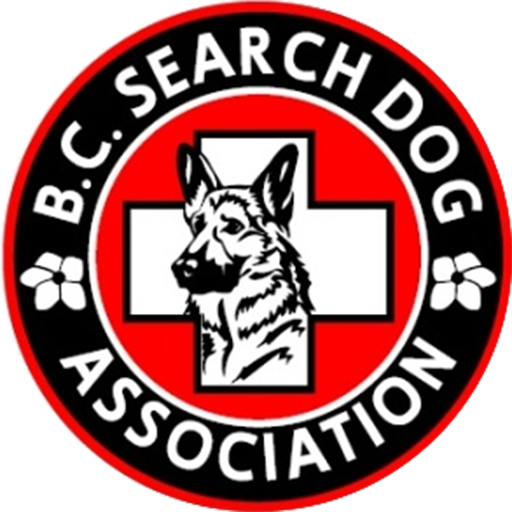GSAR Canine Team Information

The GSAR dog program in BC runs alongside that of Emergency Management BC’s (EMBC) volunteer search and rescue teams. The dog teams are certified annually by the RCMP. In order to eventually validate/certify a SAR dog with the RCMP, the handler must have completed the Ground Search and Rescue Training, and have been an active member of an EMBC recognized Search and Rescue team for a minimum of 2 years. You must also have the support of your SAR team for your intentions to become a canine handler.
It is also highly recommended that you spend some time with a currently validated handler and if possible attend one of our training camps as an observer to get a realistic view of what is involved in owning, training, and working with a SAR dog, and what kinds of dogs are best suited to this work.
Canine handlers must be willing to put an incredible amount of time (most of it on your own), effort and patience into becoming a successful working dog team. In the beginning, expect to train at least 2 times per week (often more). Each formal training event is likely to take an hour to set up – laying articles in a search area (the first trip to the area), an hour to search (the second trip) and plus daily short obedience sessions. Include daily exercise to maintain your team’s fitness at the high level required and it all adds up to lots of time. Handlers must also be skilled in navigating though the bush with a compass, understand how weather (wind, temperature) affects dog searches, and be able to keep up with their dogs in sometimes very rough bush and terrain. You also need have a high level of self motivation and initiative for those long hours out there by yourself training in all kinds of nasty weather and to persevere when you encounter challenges in your training.
The other factor often not discussed is financial. New handlers should be under no illusions – it’s not cheap to train a dog for SAR. Most of the cash outlay will be yours (vet bills, travel, gear, gas, suitable vehicle). If you’re lucky, your GSAR team may subsidize an annual training trip to a BCSDA course, but for the most part, you will spend a decent amount of your own money doing this.
To be a good candidate for Search and Rescue work a dog must possess some special characteristics. They must have intelligence, agility, stamina, drive, work ethic, confidence, and a willingness to be trained. They also require a high level of fitness and good social skills with other dogs. Aggression of any kind is unacceptable in a SAR dog. Other key dog personality traits include a desire to please the handler, be able to learn through reward (beyond food) and a willingness to be social with others (especially strangers). If a dog is unable to comfortably approach and greet other people, it’s unlikely they’ll seek and find them if they are lost.
All new dogs must undergo a puppy assessment (done by RCMP or BCSDA) before being accepted into further training. No specialized training is required for the initial assessment beyond basic puppy obedience and an attachment to a dog toy. Within the BCSDA dogs can be assessed from 6 months to 2 yrs old. Due to the time it can take to become validated (up to 2 years) and the realistic length of a working dog’s career, dogs older than 2 are not accepted into the program.
